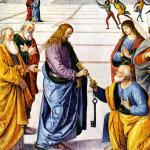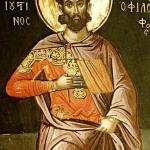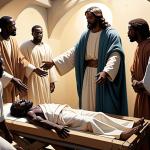+ Martin Luther’s Superb Exegesis of the Passage
1 Corinthians 11:27-30 (RSV) Whoever, therefore, eats the bread or drinks the cup of the Lord in an unworthy manner will be guilty of profaning the body and blood of the Lord. [28] Let a man examine himself, and so eat of the bread and drink of the cup. [29] For any one who eats and drinks without discerning the body eats and drinks judgment upon himself. [30] That is why many of you are weak and ill, and some have died.
Now this passage gave rise to a question, which some afterwards agitated with too much keenness — whether the unworthy really partake of the Lord’s body? For some were led, by the heat of controversy, so far as to say, that it was received indiscriminately by the good and the bad; and many at this day maintain pertinaciously, and most clamorously, that in the first Supper Peter received no more than Judas. It is, indeed, with reluctance, that I dispute keenly with any one on this point, which is (in my opinion) not an essential one; but as others allow themselves, without reason, to pronounce, with a magisterial air, whatever may seem good to them, and to launch out thunderbolts upon every one that mutters anything to the contrary, we will be excused, if we calmly adduce reasons in support of what we reckon to be true.
I hold it, then, as a settled point, and will not allow myself to be driven from it, that Christ cannot be disjoined from his Spirit. Hence I maintain, that his body is not received as dead, or even inactive, disjoined from the grace and power of his Spirit. I shall not occupy much time in proving this statement. Now in what way could the man who is altogether destitute of a living faith and repentance, having nothing of the Spirit of Christ, receive Christ himself? Nay more, as he is entirely under the influence of Satan and sin, how will he be capable of receiving Christ? While, therefore, I acknowledge that there are some who receive Christ truly in the Supper, and yet at the same time unworthily, as is the case with many weak persons, yet I do not admit, that those who bring with them a mere historical faith, without a lively feeling of repentance and faith, receive anything but the sign. For I cannot endure to maim Christ, and I shudder at the absurdity of affirming that he gives himself to be eaten by the wicked in a lifeless state, as it were. Nor does Augustine mean anything else when he says, that the wicked receive Christ merely in the sacrament, which he expresses more clearly elsewhere, when he says that the other Apostles ate the bread — the Lord; but Judas only the bread of the Lord.
But here it is objected, that the efficacy of the sacraments does not depend upon the worthiness of men, and that nothing is taken away from the promises of God, or falls to the ground, through the wickedness of men. This I acknowledge, and accordingly I add in express terms, that Christ’s body is presented to the wicked no less than to the good, and this is enough so far as concerns the efficacy of the sacrament and the faithfulness of God. For God does not there represent in a delusive manner, to the wicked, the body of his Son, but presents it in reality; nor is the bread a bare sign to them, but a faithful pledge. As to their rejection of it, that does not impair or alter anything as to the nature of the sacrament.
It remains, that we give a reply to the statement of Paul in this passage. “Paul represents the unworthy as guilty, inasmuch as they do not discern the Lord’s body: it follows, that they receive his body.” I deny the inference; for though they reject it, yet as they profane it and treat it with dishonor when it is presented to them, they are deservedly held guilty; for they do, as it were, cast it upon the ground, and trample it under their feet. Is such sacrilege trivial? Thus I see no difficulty in Paul’s words, provided you keep in view what God presents and holds out to the wicked — not what they receive. [my italics]
***
“Please Hit ‘Subscribe’”! If you have received benefit from this or any of my other 4,600+ articles, please follow this blog by signing up (with your email address) on the sidebar to the right (you may have to scroll down a bit), above where there is an icon bar, “Sign Me Up!”: to receive notice when I post a new blog article. This is the equivalent of subscribing to a YouTube channel. Please also consider following me on Twitter / X and purchasing one or more of my 55 books. All of this helps me get more exposure, and (however little!) more income for my full-time apologetics work. Thanks so much and happy reading!
***
Ellicott’s Commentary for English Readers: Sin was the cause of that body being broken and that blood shed, and therefore the one who unworthily uses the symbols of them becomes a participator in the very guilt of those who crucified that body and shed that blood.
Barnes’ Notes on the Bible: Shall eat this bread – See 1 Corinthians 11:26. Paul still calls it bread, and shows thus that he was a stranger to the doctrine that the bread was changed into the very body of the Lord Jesus. If the papal doctrine of transubstantiation had been true, Paul could not have called it bread. The Romanists do not believe that it is bread, nor would they call it such; and this shows how needful it is for them to keep the Scriptures from the people, and how impossible to express their dogmas in the language of the Bible. Let Christians adhere to the simple language of the Bible, and there is no danger of their falling into the errors of the papists. . . .*Doddridge renders it, “Shall be counted guilty of profaning and affronting in some measure that which is intended to represent the body and blood of the Lord.” . . . Bloomfield renders it, “He shall be guilty respecting the body, that is, guilty of profaning the symbols of the body and blood of Christ, and consequently shall be amenable to the punishment due to such an abuse of the highest means of grace.” . . . we are to remember:(1) That the bread and wine were symbols or emblems of that event, and designed to set it forth.
(2) to treat with irreverence and profaneness the bread which was an emblem of his broken body, was to treat with irreverence and profaneness the body itself; and in like manner the wine, the symbol of his blood.
(3) those, therefore who treated the symbols of his body and blood with profaneness and contempt were “united in spirit” with those who put him to death.
Barnes’ argument has to do with the continued use of the terms “bread” and “cup” after the bread and wine in the cup have been consecrated and transubstantiated. But this has to do with the use of phenomenological language: the language of appearances. By appearances it is still bread and wine. Paul equates the two things by writing, “eats the bread or drinks the cup of the Lord . . . profaning the body and blood . . .” Thus, in context, we know that the bread and wine have changed, per my original argument at the top.
Jesus does the same thing in John 6. He starts with the “bread from heaven” metaphor: an analogy to the manna of the Old Testament (6:31-32, 49-50). Then He transitions into making this word-picture explicitly eucharistic. He states outright in 6:51: “the bread which I shall give for the life of the world is my flesh.” Then He goes back again to the manna analogy in 6:58. Jesus still calls the eucharistic element of what was once bread and is now His Body, “bread”: “he who eats this bread will live for ever.” Obviously, it’s not literal bread that gives eternal life, but consecrated bread; i.e., His Body (transubstantiation). “I am the bread which came down from heaven” (6:41; cf. 6:32-35, 48, 50-51, 58); “the living bread” (6:51). Jesus is equating this “bread” with Himself. He does it over and over again. But they still don’t get it (6:60), and some of His disciples leave Him (6:66) because they can’t receive this message.
But despite all this, Jesus still calls the consecrated bread, bread. He refuses to stop saying “bread” when referring to what has been transformed into His body. Why? It’s because He is using phenomenological language. He had already done this in 6:50-51, then started talking about flesh and blood, then went back to “bread” to drive home the point that it was the Holy Eucharist that He was talking about. The manna gave physical life, and now the “bread” that is His flesh gives eternal life.
Likewise, in all three Last Supper eucharistic passages, Jesus “took bread” and then “gave it [bread] to” the disciples and defined it as “my body.”
Jamieson-Fausset-Brown Bible Commentary: If we do not partake of the sacramental symbol of the Lord’s death worthily, we share in the guilt of that death. (Compare “crucify to themselves the Son of God afresh,” Heb 6:6).
Similar reasoning is utilized, but the rationale for it is not given, except in a possible cross-reference to Hebrew 6:6. But that verse isn’t eucharistic. It refers to those who have fallen away from the faith. Hence I submit that it’s questionable as a legitimate cross-reference to 1 Corinthians 11:27.
Gill’s Exposition of the Entire Bible: every unworthy communicant, or that eats and drinks unworthily, may be said to be guilty of the body and blood of Christ, inasmuch as he sins against, and treats in an injurious manner, an ordinance which is a symbol and representation of these things; for what reflects dishonour upon that, reflects dishonour on the body and blood of Christ, signified therein.
Ditto to my last comment.
Matthew Poole’s Commentary: Shall be guilty of the body and blood of the Lord; shall incur the guilt of the profanation of this sacred institution; for an abuse offered to a sign, reacheth to that of which it is a sign; as the abuse of a king’s seal, or picture, is justly accounted an abuse of the king himself, whose seal and picture it is. Some carry it higher; he shall be punished, as if he had crucified Christ, the profanation of Christ’s ordinance reflecting upon Christ himself.
This is a little better, but is remarkable like all the others insofar as the possibility of literalness is casually regarded as impossible. It’s as if the obvious is ignored and everyone falls into line in offering a symbolic interpretation. The Catholic point is that the language is obviously and evidently literal.
Meyer’s NT Commentary: each man by his sins has a share in causing the death of Jesus; if now he communicates unworthily, not only do his other sins remain unforgiven, but there is added this fresh guilt besides, of having part in nailing Christ to the cross (which, with every other sin, is forgiven to the man who communicates worthily). (cf. Cambridge Bible for Schools and Colleges)
Again, this familiar Protestant explanation might be considered somewhat plausible or at least possible. The big problem with it is that nothing in the text itself suggests or justifies it. Thus, it follows that this interpretation is an eisegetical one (i.e., extraneous ideas read into the Scripture, rather than simply reading out of Scripture what is plainly and undeniably present there.
Bengel’s Gnomen tries to make the argument that unworthy partaking of Holy Communion occurs when only the cup or only the consecrated bread are received. But this is refuted in the specific language of 1 Corinthians 11:27 itself, as I explain elsewhere.
Martin Luther mostly agrees with Catholics here, because he continued to believe in the Real Presence. He sums up his exegetical argument:
It is not sound reasoning arbitrarily to associate the sin which St. Paul attributes to eating with remembrance of Christ, of which Paul does not speak. For he does not say, “Who unworthily holds the Lord in remembrance,” but “Who unworthily eats and drinks.” Now there would be no rhyme of reason in saying one becomes guilty of profaning the body of Christ through unworthy eating or the blood of Christ by unworthy drinking, if the body was not in that which was eaten and the blood in that which was drunk.
. . . the clear, natural sense of the words is that the body is in the eating, and the blood is in the drinking. And no one can produce an argument to the contrary which has any show of validity. (Against the Heavenly Prophets in the Matter of Images and Sacraments, 1525; Luther’s Works [LW], Vol. 40, 184)
Here again the sectarian spirit goes off and makes into spiritual that which St. Paul affirms is body . . . where is this written? What is the basis for it? Where is the text? . . . O helpless spirit, how long do you think you can evade the producing of Scripture or text? Are you not ashamed to have ben active so long in injecting your . . . lies, your dreams into Scripture? . . .*You must imagine that St. Paul was drink that evening, and when he spoke of unworthy eating and drinking, he forgot and talked too much, for he should have spoken about unworthy remembrance. (Ibid., 182)*In both places [considering also 1 Cor 10:16 below] he maintains that the bread of the Lord is the body of the Lord. For if this is not what he meant, he would have had to say, as above, “Whoever is unworthy of this bread, he is guilty of profaning the bread of the Lord.” How can you sin in eating the body of the Lord, if he is not present in the eating or the bread? . . .*Now the nature and character of the sentence requires us to interpret it to mean that whoever eats unworthily is guilty in regard to what he eats. . . .*All the words in the entire chapter where he condemns the unworthy eating indicate that the sin consists wholly in eating and drinking. (Ibid., 183)
1 Corinthians 10:16: The cup of blessing which we bless, is it not a participation in the blood of Christ? The bread which we break, is it not a participation in the body of Christ?
He writes:
I confess that if Karlstadt, or anyone else, could have convinced me five years ago that only bread and wine were in the sacrament he would have done me a great service. At that time I suffered such severe conflicts and inner strife and torment that I would gladly have been delivered from them. I realized that at this point I could best resist the papacy . . . But I am a captive and cannot free myself. The text is too powerfully present, and will not allow itself to be torn from its meaning by mere verbiage. (Letter to the Christians at Strassburg in Opposition to the Fanatic Spirit, 1524; LW, Vol. 40, 68)
Even if we had no other passage than this we could sufficiently strengthen all consciences and sufficiently overcome all adversaries . . .
. . . He could not have spoken more clearly and strongly . . . (Against the Heavenly Prophets in the Matter of Images and Sacraments, 1525; LW, Vol. 40, 177, 181)
Luther thinks the realist, concrete, non-symbolic nature of the verse is obvious, to the point where he seems to be aggravated (the three-time repetition of “it is”) that others can’t see what is so clear:
. . . The bread which is broken or distributed piece by piece is the participation in the body of Christ. It is, it is, it is, he says, the participation in the body of Christ. Wherein does the participation in the body of Christ consist? It cannot be anything else than that as each takes a part of the broken bread he takes therewith the body of Christ . . . (Against the Heavenly Prophets in the Matter of Images and Sacraments, 1525; LW, Vol. 40, 178)
*
Practical Matters: Perhaps some of my 4,800+ free online articles (the most comprehensive “one-stop” Catholic apologetics site) or fifty-five books have helped you (by God’s grace) to decide to become Catholic or to return to the Church, or better understand some doctrines and why we believe them.
Or you may believe my work is worthy to support for the purpose of apologetics and evangelism in general. If so, please seriously consider a much-needed financial contribution. I’m always in need of more funds: especially monthly support. “The laborer is worthy of his wages” (1 Tim 5:18, NKJV). 1 December 2021 was my 20th anniversary as a full-time Catholic apologist, and February 2022 marked the 25th anniversary of my blog.
PayPal donations are the easiest: just send to my email address: apologistdave@gmail.com. Here’s also a second page to get to PayPal. You’ll see the term “Catholic Used Book Service”, which is my old side-business. To learn about the different methods of contributing (including Zelle), see my page: About Catholic Apologist Dave Armstrong / Donation Information. Thanks a million from the bottom of my heart!
*
***
*
Photo Credit: Historical mixed media figure of John Calvin produced by artist/historian George S. Stuart and photographed by Peter d’Aprix: from the George S. Stuart Gallery of Historical Figures archive [Wikimedia Commons / Creative Commons Attribution-Share Alike 3.0 Unported license]
Summary: I examine the “physical eucharistic passage” of 1 Corinthians 11:27 & argue from reason, grammar, & the excellent exegesis of Martin Luther that it describes transubstantiation.


















